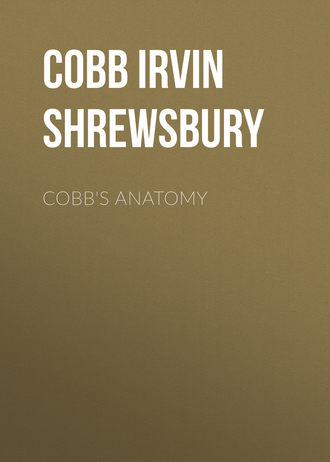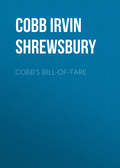
Cobb Irvin Shrewsbury
Cobb's Anatomy
Once I tried it myself. I was induced to scale the heights of a horse that was built somewhat along the general idea of the Andes Mountains, only more rugged and steeper nearing the crest. From the ground he looked to be not more than sixteen hands high, but as soon as I was up on top of him I immediately discerned that it was not sixteen hands—it was sixteen miles. What I had taken for the horse's blaze face was a snow-capped peak. Miss Anna Peck might have felt at home up there, because she has had the experience and is used to that sort of thing, but I am no mountain climber myself.
Before I could make any move to descend to the lower and less rarefied altitudes the horse began executing a few fancy steps, and he started traveling sidewise with a kind of a slanting bias movement that was extremely disconcerting, not to say alarming, instead of proceeding straight ahead as a regular horse would. I clung there astraddle of his ridge pole, with my fingers twined in his mane, trying to anticipate where he would be next, in order to be there to meet him if possible; and I resolved right then that, if Providence in His wisdom so willed it that I should get down from up there alive, I would never do so again. However, I did not express these longings in words—not at that time. At that time there were only two words in the English language which seemed to come to me. One of them was "Whoa" and the other was "Ouch," and I spoke them alternately with such rapidity that they merged into the compound word "Whouch," which is a very expressive word and one that I would freely recommend to others who may be situated as I was.
At that moment, of all the places in the world that I could think of—and I could think of a great many because the events of my past life were rapidly flashing past me—as is customary, I am told, in other cases of grave peril, such as drowning—I say of all the places in the world there were just two where I least desired to be—one was up on top of that horse and the other was down under him. But it seemed to be a choice of the two evils, and so I chose the lesser and got under him. I did this by a simple expedient that occurred to me at the moment. I fell off. I was tramped on considerably, and the earth proved to be harder than it looked when viewed from an approximate height of sixteen miles up, but I lived and breathed—or at least I breathed after a time had elapsed—and I was satisfied. And so, having gone through this experience myself, I am in position to appreciate what any other man of my general build is going through as I see him bobbing by—the poor martyr, sacrificing himself as a burnt offering, or anyway a blistered one—on the high altar of a Gothic ruin of a horse. And, besides, I know that riding a horse doesn't reduce a fat man. It merely reduces the horse.
So it goes—the fat man is always up against it. His figure is half-masted in regretful memory of the proportions he had once, and he is made to mourn. Most sports and many gainful pursuits are closed against him. He cannot play lawn tennis, or, at least according to my observation, he cannot play lawn tennis oftener than once in two weeks. In between games he limps round, stiff as a hat tree and sore as a mashed thumb. Time was when he might mingle in the mystic mazes of the waltz, tripping the light fantastic toe or stubbing it, as the case may be. But that was in the days of the old-fashioned square dance, which was the fat man's friend among dances, and also of the old-fashioned two-step, and not in these times when dancing is a cross between a wrestling match, a contortion act and a trip on a roller-coaster, and is either named for an animal, like the Bunny Hug and the Tarantula Glide, or for a town, like the Mobile Mop-Up, and the Far Rockaway Rock and the South Bend Bend. His friends would interfere—or the authorities would. He can go in swimming, it is true; but if he turns over and floats, people yell out that somebody has set the life raft adrift; and if he basks at the water's edge, boats will come in and try to dock alongside him; and if he takes a sun bath on the beach and sunburns, there's so everlasting much of him to be sunburned that he practically amounts to a conflagration. He can't shoot rapids, craps or big game with any degree of comfort; nor play billiards. He can't get close enough to the table to make the shots, and he puts all the English on himself and none of it on the cue ball.
Consider the gainful pursuits. Think how many of them are denied to the man who may have energy and ability but is shut out because there are a few extra terraces on his front lawn. A fat man cannot be a leading man in a play. Nobody desires a fat hero for a novel. A fat man cannot go in for aeroplaning. He cannot be a wire-walker or a successful walker of any of the other recognized brands—track, cake, sleep or floor. He doesn't make a popular waiter. Nobody wants a fat waiter on a hot day. True, you may make him bring your order under covered dishes, but even so, there is still that suggestion of rain on a tin roof that is distasteful to so many.
So I repeat that fat people are always getting the worst of it, and I say again, of all the ills that flesh is heir to, the worst is the flesh itself. As the poet says—"The world, the flesh and the devil"—and there you have it in a sentence—the flesh in between, catching the devil on one side and the jeers of the world on the other. I don't care what Dr. Woods Hutchinson or any other thin man says! I contend that history is studded with instances of prominent persons who lost out because they got fat. Take Cleopatra now, the lady to whom Marc Antony said: "I am dying, Egypt, dying," and then refrained from doing so for about nineteen more stanzas. Cleo or Pat—she was known by both names, I hear—did fairly well as a queen, as a coquette and as a promoter of excursions on the river—until she fleshened up. Then she flivvered. Doctor Johnson was a fat man and he suffered from prickly heat, and from Boswell, and from the fact that he couldn't eat without spilling most of the gravy on his second mezzanine landing. As a thin and spindly stripling Napoleon altered the map of Europe and stood many nations on their heads. It was after he had grown fat and pursy that he landed on St. Helena and spent his last days on a barren rock, with his arms folded, posing for steel engravings. Nero was fat, and he had a lot of hard luck in keeping his relatives—they were almost constantly dying on him and he finally had to stab himself with one of those painful-looking old Roman two-handed swords, lest something really serious befall him. Falstaff was fat, and he lost the favor of kings in the last act. Coming down to our own day and turning to a point no farther away than the White House at Washington—but have we not enough examples without becoming personal? Yes, I know Julius Caesar said: "Let me have men about me that are fat." But you bet it wasn't in the heated period when J. Caesar said that!
TEETH
One of the most pleasant features about being born, as I conceive it, is that we are born without teeth. I believe there have been a few exceptions to this rule—Richard the Third, according to the accounts, came into the world equipped with all his teeth and a perfectly miserable disposition; and once in a while, especially during Roosevelt years, when the Colonel's picture is hanging on the walls of so many American homes, we read in the paper that a baby has just been born somewhere with a full set, and even, as in the case of the infant son of a former member of the Rough Riders, with nose glasses and a close-cropped mustache. This, however, may have been a pardonable exaggeration of the real facts. As I recall now, it was reported in a dispatch to the New York Tribune from Lover's Leap, Iowa, during the presidential campaign eight years ago.
In the main, though, we are born without teeth. We are born without a number of things—clothes for example—although Anthony Comstock is said to be pushing a law requiring all children to be born with overalls on; but teeth is the subject which we are now discussing. This absence of teeth tends to give the very young of our species the appearance in the face of an old fashioned buckskin purse with the draw string broken, but be that as it may, we are generally fairly well content with life until the teeth begin to come.
First there are the milk teeth. Right there our troubles start. To use the term commonly in use, we cut them, although as a matter of fact, they cut us—cut them with the aid of some such mussy thing as a toothing ring or the horny part of the nurse's thumb, or the reverse side of a spoon—cut them at the cost of infinite suffering, not only for ourselves but for everybody else in the vicinity. And about the time we get the last one in we begin to lose the first one out. They go one at a time, by falling out, or by being yanked out, or by coming out of their own accord when we eat molasses taffy. They were merely what you might call our Entered Apprentice teeth. We go in now for the full thirty-two degrees—one degree for each tooth and thirty-two teeth to a set. By arduous and painful processes, stretching over a period of years, we get our regular teeth—the others were only volunteers—concluding with the wisdom teeth, as so called, but it is a misnomer, because there never is room for them and they have to stand up in the back row and they usually arrive with holes in them, and if we really possessed any wisdom we would figure out some way of abolishing them altogether. They come late and crowd their way in and push the other teeth out of line and so we go about for months with the top of our mouths filled with braces and wires and things, so that when we breathe hard we sob and croon inside of ourselves like an Aeolean harp.
But in any event we get them all and no sooner do we get them than we begin to lose them. They develop cavities and aches and extra roots and we spend a good part of our lives and most of our substance with the dentist. Nevertheless, in spite of all we can do and all he can do, we keep on losing them. And after awhile, they are all gone and our face folds up on us like a crush hat or a concertina and from our brow to our chin we don't look much more than a third as long as we used to look. We dislike this folded-up appearance naturally—who wouldn't? And we get tired of living on spoon victuals and the memory of past beef-steaks. So we go and get some false ones made. They have to be made to order; there appears to be no market for custom made teeth; you never see any hand-me-down teeth advertised, guaranteed to fit any face and withstand a damp climate. Getting them made to order is a long and unhappy process and I will pass over it briefly. Having got them, we find that they do not fit us or that we do not fit them, which comes to the same thing. The dentist makes them fit by altering us some and the teeth some, and after some months they quit feeling as though they didn't belong to us but had been borrowed temporarily from somebody's loan collection of ceramics.
But just about the time they are becoming acclimated and we are getting used to them, the interior of our mouth for private reasons best known to itself changes around materially and we either have to go back and start all over and go through the whole thing again, or else haply we die and pass on to the bourne from which no traveller returneth either with his teeth or without them. If Shakespeare had only thought of it—and he did think of a number of things from time to time—he might have divided his Seven Ages of Man much better by making them the Seven Ages of Teeth as follows: First age—no tooth; second age—milk teeth; third age—losing 'em; fourth age—getting more teeth; fifth age—losing 'em; sixth age—getting false teeth and finding they aren't satisfactory; seventh age—toothless again.
I knew a man once who was a gunsmith and lost all his teeth at a comparatively early age. He went along that way for years. He had to eschew the tenderloin for the reason that he couldn't chew it, and he had to cut out hickory nut cake and corn on the ear and such things. But there is nothing about the art of gunsmithing which seems to call for teeth, so he got along very well, living in a little house with the wife of his bosom and a faithful housedog named Ponto. But when he was past sixty he went and got himself some teeth from the dentist. He did this without saying anything about it at home; he was treasuring it up for a surprise. The corner stone was laid in May and the scaffolding was all up by July and in August the new teeth were dedicated with suitable ceremonies.
They altered his appearance materially. His nose and chin which had been on terms of intimacy now rubbed each other a last fond good-bye and his face lost that accordion-pleated look and straightened out and became about six or seven inches longer from top to bottom. He now had a sort of determined aspect like the iron jawed lady in a circus, whereas before his face had the appearance of being folded over and wadded down inside of his neck band, so his hat could rest comfortably on his collar. He knew he was altered, but he didn't realize how much he was altered until he went home that evening and walked proudly in the front gate. His wife who was timid about strangers, slammed the door right in his face and faithful Ponto came out from under the porch steps and bit him severely in the calf of the leg. There was only one consolation in it for him—for the first time in a long number of years he was in position to bite back.
And that's how it is with teeth—with your teeth let us say—for right here I'm going to drop the personal pronoun and speak of them as your teeth from now on. If anybody has to suffer it might as well be you and not me; I expect to be busy telling about it. As I started to say awhile ago, you—remember it's you from this point—you get your regular teeth and they start right in giving you trouble. Every little while one of them bursts from its cell with a horrible yell and in the lulls between pangs you go forth among men with the haunted look in your eye of one who is listening for the footfalls of a dread apparition, and one half of your head is puffed out of plumb as though you were engaged in the whimsical idea of holding an egg plant in the side of your jaw. A kind friend meets you, and, speaking with that high courage and that lofty spirit of sacrifice which a kind friend always exhibits when it's your tooth that is kicking up the rumpus and not his, he tells you you ought to have something done for it right away. You know that as well as he does, but you hate to have the subject brought up. It's your toothache anyhow. It originated with you. You are its proud parent but not so awfully proud at that. Mother and child doing as well as could be expected, but not expected to do very well.
But these friends of yours keep on shoving their free advice on you and the tooth keeps on getting worse and worse until the pain spreads all through the First Ward and finally you grab your resolution in both hands to keep it from leaking out between your fingers and you go to the dentist's.
This happens so many times that after awhile you lose count and so would the dentist, if he didn't write your name down every time in his little red book with pleasingly large amounts entered opposite to it. It seems to you that you are always doing something for your teeth? You have them pulled and pushed and shoved and filled and unfilled and refilled and excavated and blasted and sculptured and scroll-sawed and a lot of other things that you wouldn't think could be done legally without a building permit. As time passes on, the inside of your once well-tilled and commodious head becomes but little more than a recent site. Your vaults have been blown and most of your contents abstracted by Amalgam Mike and Dental Slim, the Demon Yeggmen of the Human Face. You are merely the scattered clews left behind for the authorities to work on; you are the faint traces of the fiendish crime. You are the point marked X.
But all along there is generally one tooth that has behaved herself like a lady. Other teeth may have betrayed your confidence but Old Faithful has hung on, attending to business, asking only for standing room and kind treatment. The others you may view with alarm, but to this tooth you can point with pride. But have a care—she is deceiving you.
Some night you go to bed and have a dream. In your dream it seems to you that a fox terrier is chasing a woodchuck around and around the inside of your head. In that tangled sort of fashion peculiar to dreams your sympathy seems to go out first to the fox terrier and then to the woodchuck as they circle about nimbly, leaping from your tonsils to your larynx and then up over the rafters in the roof of your mouth and down again and pattering over the sub-maxillary from side to side. But about then you wake up with a violent start and decide that any sympathy you may have in stock should be reserved for personal use exclusively, because at this moment the dog trees the woodchuck at the base of that cherished tooth of yours and starts to dig him out. He is a very determined dog and very active, but he needs a manicure. You are struck by that fact almost immediately.






